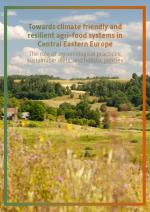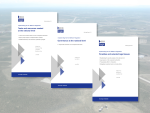Ecologic Institute Newsletter No 261 – June 2024
- Ecologic Institute Newsletter
Towards Climate-friendly and Resilient Agri-food Systems in Central Eastern Europe – Report
This report provides an analysis of how the CEE countries are currently using the main policy instruments at their disposal – the Common Agricultural Policy (CAP) and the National Energy and Climate Plans (NECPs) – to support the sustainability transition in agri-food systems. The report identifies gaps and recommendations for their improvement and furthermore highlights key strategies for achieving climate goals, enhancing biodiversity, and promoting soil health as well as climate resilience in the region. The report is complemented by a summary and a policy brief in twelve languages, which was prepared specifically for the CEE stakeholders.
Implementing the EU Methane Regulation – Working Paper Series
These three working papers aim to support the responsible ministries and competent authorities (CA) of the EU Member States (MS) in implementing the EU Methane Emission Regulation that enters into force in 2024. Its implementation requires substantial executive action as well as some regulatory provisions at the national level. This series of papers provides analyses, information, and practical support to help MS and encourage the newly established competent authorities to implement the EU-MER effectively, thoroughly, timely, and efficiently.
Design of Greener Drugs – Article
The article "Design of Greener Drugs: Aligning parameters in pharmaceutical R&D and drivers for environmental impact", published in Drug Discovery Today, explores the challenges and opportunities in developing pharmaceuticals that are not only safe and effective for patients but also environmentally sustainable. This open access article – written by a cross-disciplinary team consisting of university representatives, regulators, research-based pharmaceutical companies as well as SMEs – identifies the most promising areas for action in pharmaceutical research and development. In particular, it aims to build a bridge between the scientific concepts of environmental science and those of pharmaceutical R&D.
Enhancing Water Retention in Landscapes – Article
The latest study published in Wasserwirtschaft highlights innovative approaches to improving water retention across landscapes in Germany. As part of the WADKlim project, funded by the German Environmental Protection Agency, the research details 69 measures aimed at mitigating the impacts of climate-related extreme events like floods and droughts. Notable strategies include adjusted crop rotations or the use of buffer strips, which are both effective and economically viable. In the article, Dr. Ulf Stein, Hannes Schritt, and their colleagues emphasize the quick implementation and rapid benefits of these measures, such as biodiversity conservation, flood protection, and drought resilience. The findings serve as a crucial toolkit for improving water balance and ecosystem resilience by proposing an integrated "sponge landscaping" approach to urban and rural planning.
Practical First Steps Towards Comprehensive Subsidy Reform – Article
This expert assessment addresses the lack of interest among WTO members in adapting multilateral subsidy rules. This is particularly troubling given the increasing introduction of new forms of support by many countries, which could reinforce existing policy disincentives and thus jeopardize sustainable economic and environmental effects worldwide. The article emphasizes the urgency of a comprehensive approach to analyzing the impact of government support in the areas of fossil fuels, agriculture, fisheries, industry, and advanced technologies.
A Spotlight on Nature-Based Solutions
Speech: Dr. Ulf Stein, McKenna Davis, Jenny Tröltzsch
From 15 to 17 May 2024, Barcelona hosted the CONEXUS Conference, a flagship event bringing together over 100 experts from Europe and Latin America to discuss nature-based solutions (NbS) for climate-resilient cities. This conference was a melting pot of ideas and innovations, fostering exchange on the economic, social, environmental, and political facets of NbS implementation. Among the key sessions were the presentations "Governance, Politics, and Planning" and "Economics, Values, and Work," where Ecologic experts Dr. Ulf Stein, McKenna Davis, and Jenny Tröltzsch shared their research and insights.
Prosecution Under the Amended Environmental Crime Directive
Speech: Dr. Stephan Sina
Dr. Stephan Sina gave a presentation on prosecution under the amended Environmental Crime Directive at an information event about the new EU environmental criminal law, organized by Green Legal Impact and Stop Ecocide Germany. He began by describing the special features of criminal prosecution in the environmental sector and the reason for the first-time inclusion of criminal prosecution provisions in the Directive. He then gave an overview of the regulations on resources and training, co-operation between authorities, the national strategy for combating environmental crime, and statistical data. The presentation ended with examples of challenges and approaches to implementing the directive in Germany.
Navigating Urban Climate Transformations: Unravelling the Mechanisms of Successful Long-term Climate Neutrality Strategies in Cities
Speech: Doris Knoblauch
At the 16th NESS (Nordic Environmental Social Science Conference) in Turku, (Finland), Doris Knoblauch presented the results of two projects on urban climate transformation. Knoblauch emphasized that despite the ambitious climate neutrality goals of many cities, there is a knowledge gap in terms of implementing these strategies. Based on the EUKI project Ready4NetZero, she identified key factors such as effective governance structures, the inclusion of diverse perspectives and clear objectives. She also gave insights into the INTERLACE project, which developed governance tools through co-creative processes in six cities.
Annual Flagship Report 2024 – ECNO Launch Event
This year's EU-wide progress report provides an update on the EU's progress towards climate neutrality based on new data, and highlights crucial areas for action for future EU policymakers. At our launch event in Brussels, we will present our latest findings and engage with relevant high-profile stakeholders from the European Parliament and the economy. We will host two thematic panels on topics that move the EU at the moment: industrial transformation and just transition for the people of the EU.
Launch of the New BiodivRestore Knowledge Hub
Dr. Benjamin Kupilas and Dr. Ulf Stein attended the launch of the new BiodivRestore Knowledge Hub in Paris on 30 and 31 May 2024. Both have been appointed as experts to the hub, which is a thematic network consisting of selected researchers with expertise in biodiversity and ecosystem restoration. During the next 1.5 years, the network will contribute to the integration and sharing of knowledge and technological excellence to support countries in the development and implementation of their National Restoration Plans. The hub will help ensure that countries can reach the targets set out in the EU Biodiversity Strategy 2030 and Global Biodiversity Framework. It will also facilitate and improve networking between researchers and stakeholders to increase research impact and knowledge transfer between science, policy, and society.
Contents
- Publications
- Towards Climate-friendly and Resilient Agri-food Systems in Central Eastern Europe – Report
- Implementing the EU Methane Regulation – Working Paper Series
- Design of Greener Drugs – Article
- Enhancing Water Retention in Landscapes – Article
- Practical First Steps Towards Comprehensive Subsidy Reform – Article
- Recent: Presentations and Events
- A Spotlight on Nature-Based Solutions
- Prosecution Under the Amended Environmental Crime Directive
- Navigating Urban Climate Transformations: Unravelling the Mechanisms of Successful Long-term Climate Neutrality Strategies in Cities
- Register Now!
- Annual Flagship Report 2024 – ECNO Launch Event
- News
- Launch of the New BiodivRestore Knowledge Hub


